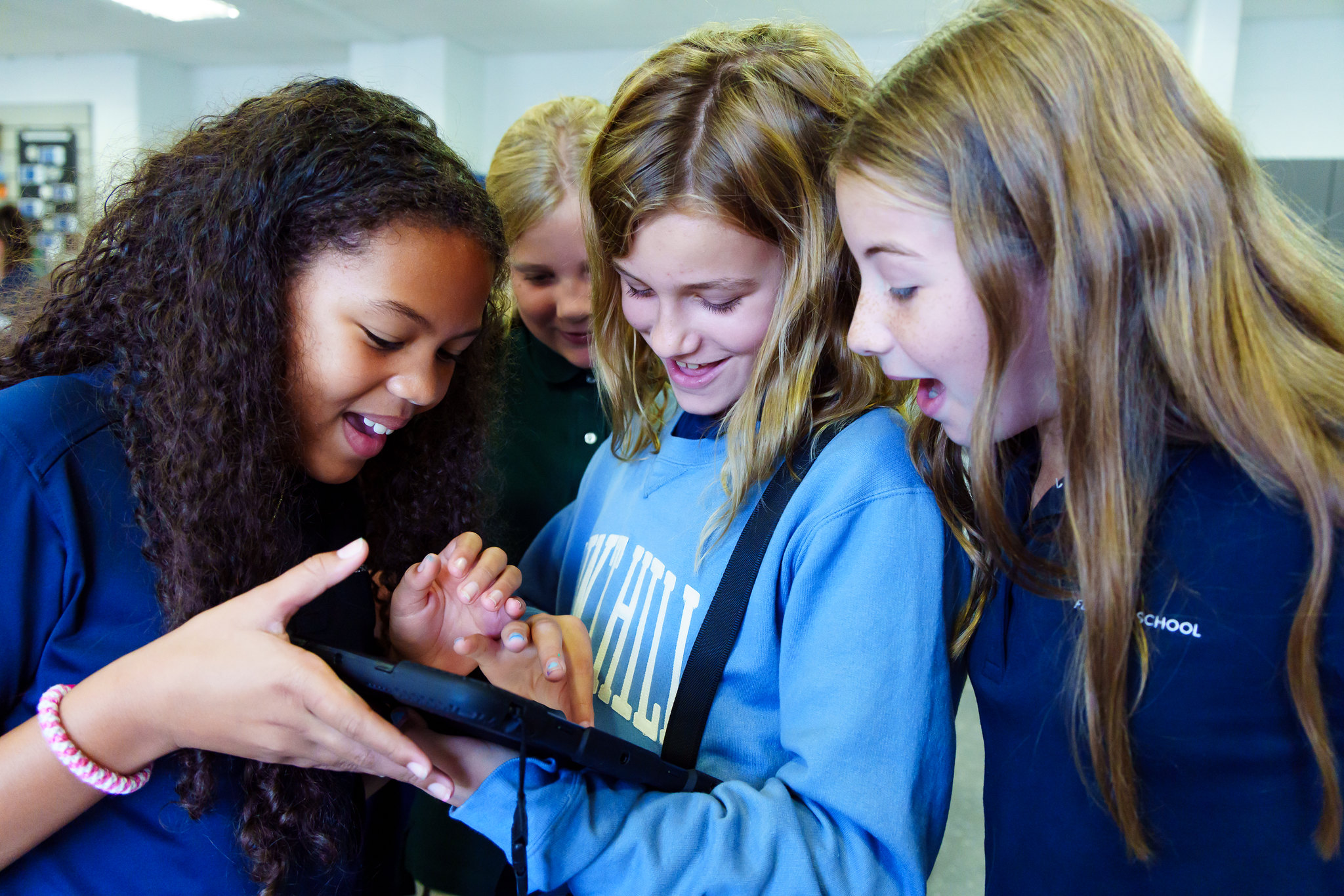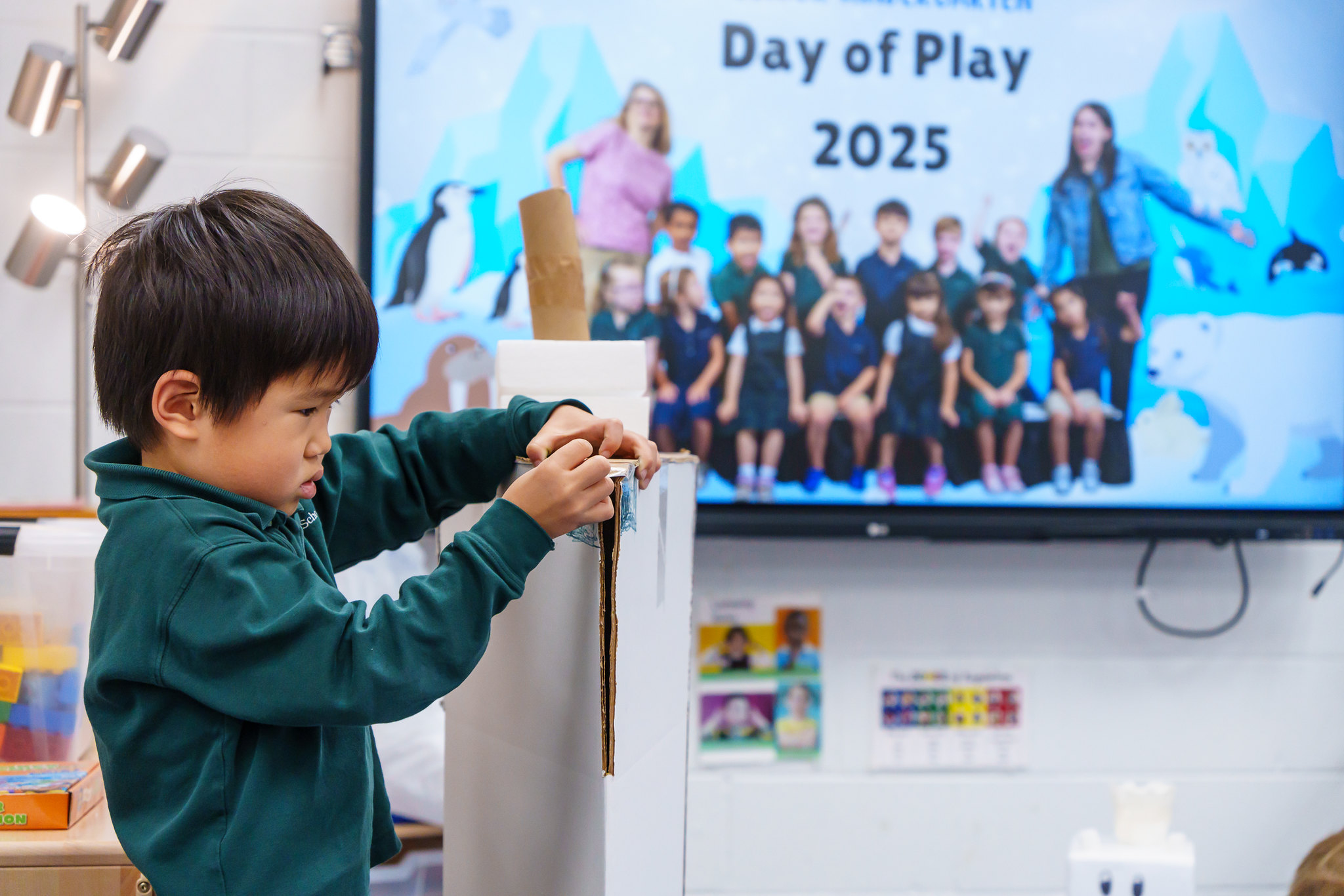HUSKY HIGHLIGHTS

May 19, 2025
By Carolyn Pitches, LS Math Department Chair
What Is ‘Differentiated Instruction’? Math Enrichment in Flint Hill’s Lower School
At Flint Hill School, math enrichment is not just an add-on; it's an integral part of the learning experience, carefully woven into the curriculum from Junior Kindergarten through 6th grade. Our math specialists focus on enrichment, while our learning specialists provide support. In this piece, I’ll walk you through enrichment by grade level.
JK-1: Building a Foundation for Enrichment
Enrichment occurs within the math workshop model in our youngest grades. We use rotations during the “meet with the teacher” part of the workshop, where students are grouped according to their needs for any given unit of study. Rotation groups may change with each unit or even for an individual lesson within a unit. This workshop structure allows for enrichment options in every activity, encouraging students to delve deeper into the concepts being taught. For students needing additional support, activities can be modified to meet their specific needs. Our co-teaching model in grades JK-1, with two teachers in each class, provides an added advantage, ensuring individualized attention.
Grades 2-3: Transitioning to Big Ideas Curriculum
As students progress into 2nd and 3rd grade, they transition to a new curriculum called “Big Ideas," which offers even more opportunities for enrichment. This program has a resource center for teachers, providing a wealth of tools to enrich the learning experience. Teachers utilize the workshop model at least once or twice per unit, typically involving three to four rotations. These rotations include teacher-led instruction and guided practice, tech-based activities such as ST Math, hands-on games with partners, and independent practice to assess individual understanding.
Grades 3-5: Specialist-Led Enrichment and Problem-Solving
In grades 3-5, math specialists play a more direct role in enrichment. Math specialists come into the classroom once a week during the math lesson. We also start to pull out students who need enrichment to work on the Noetic Math Challenge, a program that focuses on developing problem-solving and critical thinking skills separate from the regular math curriculum.
Students learn strategies such as identifying knowns and unknowns, and they collaborate to find solutions, emphasizing teamwork and peer-to-peer learning. Instead of just providing the answer to a specific problem, we utilize the inquiry model of learning. As a result, students learn to ask questions, investigate possibilities, and construct their own knowledge. Teachers design project-based learning experiences directly tied to learning targets, empowering students to demonstrate their understanding of math concepts through creative expression.
Students are aware of and involved in their own learning needs and participate actively in deciding when they require additional support or enrichment.
Grade 5: Accelerated Learning
5th grade offers an accelerated math class option. These students engage in a condensed curriculum that combines both Grade 5 and Grade 6 benchmarks, eliminating information and exercises that are redundant or not essential to students’ learning. This allows them to progress through advanced content at an accelerated pace. Flexible grouping within classes ensures that all students are challenged appropriately. Students also participate in small group sessions for Noetic Math Challenge work, depending on their interest level.
Grade 6: Preparing for Higher-Level Math & Cross-Divisional Collaboration
6th grade students are also offered accelerated math options, either digging deeper into grade-level math content or starting pre-algebra. This provides a strong foundation for future success in Pre-Algebra Honors or Algebra I Honors in 7th grade. We closely collaborate with our middle school math teachers, ensuring a seamless transition. That said, classes look different for 6th graders versus 7th graders due to their developmental needs, and we adjust based on those needs.
Additional Enrichment Opportunities
Our Lower School also offers occasional before- or after-school math intervention for advanced students who seek additional challenges. One example is a pre-algebra club for 6th graders, which helps determine if students are ready for Algebra I Honors. This club is offered as needed, demonstrating the school's commitment to meeting the unique needs of each student.
A Smooth Transition for All
Flint Hill’s Lower School math program is designed to nurture a love for math while providing the support and enrichment necessary for every student to thrive. Our differentiated model offers a meaningful and relevant learning experience that supports students transitioning from Advanced Academic Programs (AAP). With smaller class sizes, teachers have the flexibility to provide enrichment opportunities tailored to student interests and needs, creating a dynamic and supportive environment for continued academic growth.
Want to know more about our math curriculum? Read this helpful Lower School Math overview! (PDF)
Carolyn Pitches has a B.A. in elementary/middle school education from Virginia Tech and a M.Ed. from George Mason University. She has worked in education for 31 years, 18 of those at Flint Hill School.
LEARN MORE ABOUT FLINT HILL
Fill out the form to receive updates from our team.
RECOMMENDED FOR YOU
Joining Flint Hill in 5th grade is a purposeful step into a community that understands, values, and challenges students at a critical stage in their...
For students, a sense of connection with others and belonging to a community benefits every aspect of their health, improves family relationships, reduces risk-taking behaviors,...
What may look like play is, in fact, a period of remarkable cognitive growth.
You don’t need to become a teacher — you just need to nurture curiosity and independence. Here are a few simple and meaningful ways to...






